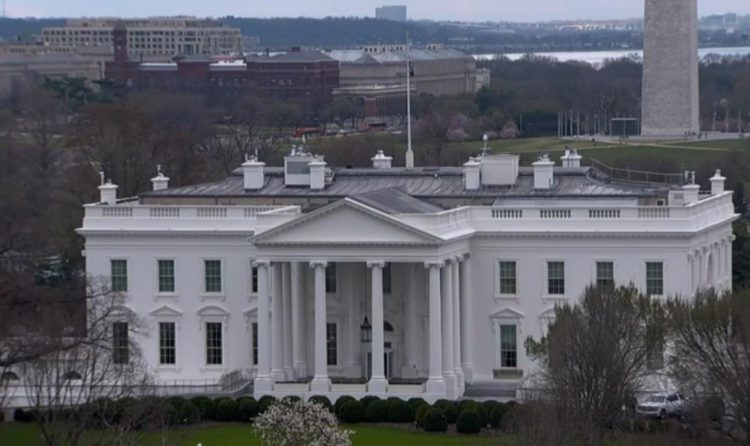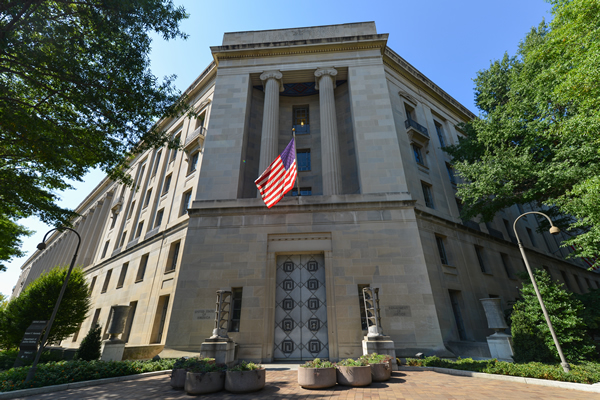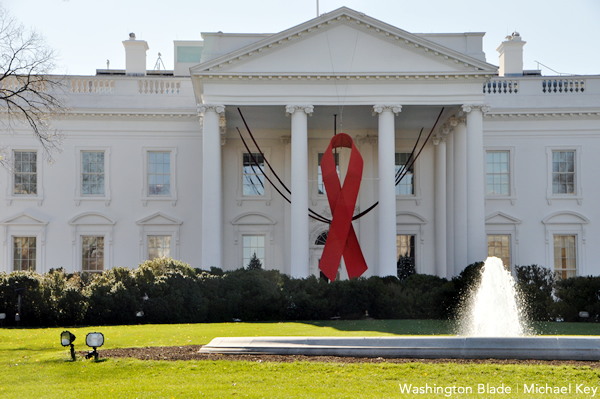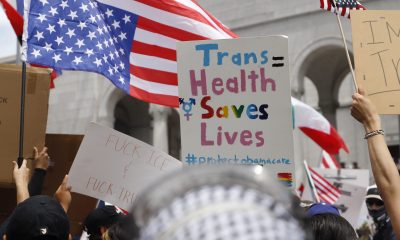White House
White House reiterates concern for LGBTQ+ Ukrainians after Russia invasion
Administration has ‘engaged directly’ with vulnerable groups

WASHINGTON — A Biden administration official on Friday said the U.S. has “engaged directly” with LGBTQ+ Ukrainians and other groups that Russia may target if it gains control of their country.
“We have engaged directly with these populations to direct them to programs that offer emergency assistance to address relocation, medical expenses or other unexpected costs,” the official told the Washington Blade. “And we have engaged with allies and partners to try to ensure that those who must flee Ukraine have somewhere to go.”
The official noted that “based on Russia’s past behavior, it is reasonable to expect that Russia’s authorities would target those who oppose or are perceived to oppose the Russian government’s actions or policies, and/or belong to groups of persons targeted for repression inside Russia. The aforementioned would include leading Ukrainian officials, Russian and Belarusian dissidents in exile in Ukraine, independent journalists, anti-corruption activists, vulnerable populations such as members of some religious and ethnic groups, and LGBTQI+ persons.”
“We are also concerned about the safety of persons with disabilities in any conflict situation,” said the official.
“We have warned and will continue to warn groups in the categories we think could be targeted based on our understanding of Russia’s past behavior and our knowledge of Russia’s plans in order to enable them to protect themselves or move to places where they might be safer,” added the official. “We’ve been warning the Ukrainian government of all that may be coming, as well.”
The official spoke with the Blade less than two days after Russia’s invasion of Ukraine began.
The U.S. earlier this week in a letter to U.N. High Commissioner for Human Rights Michelle Bachelet said Russia plans to target LGBTQ+ Ukrainians and other vulnerable groups the Biden administration official noted to the Blade. A Russian government spokesperson on Tuesday described the claim to the Blade as “propaganda.”
The Congressional LGBTQ+ Equality and Ukraine Caucuses in a letter they sent to Secretary of State Antony Blinken on Tuesday said they are “particularly concerned for the well-being of lesbian, gay, bisexual, transgender and queer (LGBTQ) Ukrainians and other marginalized groups in Ukraine.”
“There is an impending humanitarian emergency in Ukraine and Ukraine’s partners — including the U.S. — must take action to protect Ukrainian lives, with a particular focus on minority communities,” reads the letter. “LGBTQ Ukrainians as well as Ukrainians with disabilities, the elderly, and other marginalized groups face greater hurdles in seeking safety as a Russian incursion into Ukraine begins.”
“We must safeguard the rights of marginalized people in Ukraine and ensure they are protected as this crisis unfolds,” it adds.
The letter notes Ukraine in recent years “has made great strides towards securing equality for LGBTQ people within its borders and is a regional leader in LGBTQ rights.” These advances include a ban on workplace discrimination based on sexual orientation and gender identity and efforts to protect Pride parades.
Ukrainian President Volodymyr Zelenskyy last November pledged his country would continue to fight anti-LGBTQ+ discrimination after he met with President Biden at the White House.
“LGBTQ civil society in Ukraine is robust and visible with numerous LGBTQ groups officially registered as non-governmental entities,” reads the letter to Blinken. “While there is still work to do, these advancements stand in stark contrast to Russia’s positions on LGBTQ equality. Increased Russian government influence on the lives of Ukrainians is likely to be incredibly harmful to the rights of LGBTQ people in Ukraine.”
The State Department has not responded to the Blade’s request for comment on the letter.
LGBTQ Victory Institute President Annise Parker on Thursday echoed calls for the U.S. to protect LGBTQ+ Ukrainian activists and other vulnerable groups.
“We call on the United States and our allies to ensure the unique vulnerabilities of Ukrainian LGBTQ leaders and civil society are part of all diplomatic talks and negotiations. Their safety must be paramount,” said Parker in a statement. “The future of Ukrainian democracy depends on it.”
The Global Equality Caucus, a group of LGBTQ+ elected officials from around the world that fights discrimination based on sexual orientation and gender identity, share Parker’s concerns.
“We are concerned that Russia’s subversion of Ukrainian democracy and sovereignty has put human rights defenders in the country at immediate risk,” said the group on Friday in a statement. “We call on governments worldwide to recognize the humanitarian impact of this invasion and to take necessary action to ensure any Ukrainian at risk of persecution can be guaranteed safety elsewhere.”
A Wider Bridge and more than a dozen other LGBTQ+ Jewish organizations in the U.S. and around the world on Friday condemned Russia’s invasion of Ukraine and expressed their “solidarity with the people of Ukraine.” The groups, along with the Global Equality Caucus and the Victory Institute, are also concerned for LGBTQ+ Ukrainians and other groups, including Jewish Ukrainians, inside Ukraine.
“The Ukrainian Jewish and LGBTQ communities face particularly acute vulnerabilities,” reads the groups’ statement. “They have historically been marginalized and continue to face ongoing discrimination. We are deeply concerned that LGBTQ people overall and LGBTQ Jews, in particular, will be subject to scapegoating in what may become a vast humanitarian crisis.”
White House
DOJ launches investigation into Calif. trans student-athlete policy
State AG vows to defend Golden State laws

One day after President Donald Trump threatened to strip California of “large scale federal funding” over its policy on transgender student-athletes, his Justice Department announced it is investigating the state for potentially violating Title IX.
“The investigation is to determine whether California, its senior legal, educational, and athletic organizations, and the school district are engaging in a pattern or practice of discrimination on the basis of sex,” the DOJ said in a statement.
The DOJ said it notified State Attorney General Rob Bonta, State Superintendent of Public Instruction Tony Thurmond, the Jurupa Unified School District, and the California Interscholastic Federation of its investigation.
AB Hernandez, 16, is an out trans female student-athlete at Jurupa Valley High School who qualified for this weekend’s state track and field championship. As the Los Angeles Blade reported earlier this week, the CIF announced a change in the rules at the finals to accommodate girls who were displaced by Hernandez, including giving medals to cisgender competitors who earn a podium spot should Hernandez place ahead of them.
“We remain committed to defending and upholding California laws and all additional laws which ensure the rights of students, including transgender students, to be free from discrimination and harassment,” said Bonta in a statement. “We will continue to closely monitor the Trump administration’s actions in this space.”
As KTLA reported, California is one of 22 states that allow trans student-athletes to participate in sports consistent with their gender identity. Former Gov. Jerry Brown signed that policy into law in 2013.
The DOJ announced it is also now supporting a federal lawsuit targeting Bonta and the state Department of Education, claiming that California law and CIF policy discriminate against cisgender girls by allowing trans female athletes to compete according to their gender identity.
The lawsuit was filed by a conservative law group, Advocates for Faith and Freedom, representing the families of two girls at Martin Luther King High School in Riverside. Their suit claims the school’s cross-country team dropped one athlete from her varsity spot in favor of a trans athlete and that school administrators compared their “Save Girls Sports” T-shirts to swastikas.
Officials in Washington also weighed-in, referring to trans girls and women as “males.”
“Title IX exists to protect women and girls in education,” said Assistant U.S. Attorney General for Civil Rights Harmeet K. Dhillon. “It is perverse to allow males to compete against girls, invade their private spaces, and take their trophies.”
“The law is clear: Discrimination on the basis of sex is illegal and immoral,” said U.S. Attorney Bill Essayli. “My office and the rest of the Department of Justice will work tirelessly to protect girls’ sports and stop anyone — public officials included — from violating women’s civil rights.”
According to Gov. Gavin Newsom’s office, out of the 5.8 million students in California’s K-12 public school system, the number of active trans student-athletes is estimated to be in the single digits.
Politics
Trump bars trans women and girls from sports
The administration reversed course on the Biden-Harris policy on Title IX

President Donald Trump on Wednesday issued another executive order taking aim at the transgender community, this time focusing on eligibility for sports participation.
In a signing ceremony for “Keeping Men Out of Women’s Sports” in the East Room of the White House, the president proclaimed “With this executive order, the war on women’s sports is over.”
Despite the insistence by Trump and Republicans that trans women and girls have a biological advantage in sports over cisgender women and girls, the research has been inconclusive, at best.
A study in the peer reviewed Sports Medicine journal found “no direct or consistent research” pointing to this conclusion. A different review in 2023 found that post-pubertal differences are “reduced, if not erased, over time by gender affirming hormone therapy.”
Other critics of efforts to exclude trans student athletes have pointed to the small number of people who are impacted. Charlie Baker, president of the National Collegiate Athletic Association, testified last year that fewer than 10 of the NCAA’s 522,000+ student athletes identify as trans.
The Trump-Vance administration has reversed course from the Biden-Harris administration’s policy on Title IX rules barring sex-based discrimination.
“If you’re going to have women’s sports, if you’re going to provide opportunities for women, then they have to be equally safe, equally fair, and equally private opportunities, and so that means that you’re going to preserve women’s sports for women,” a White House official said prior to the issuance of the order.
Former President Joe Biden’s Title IX rules, which went into effect last year, clarified that pursuant to the U.S. Supreme Court’s ruling in Bostock v. Clayton County (2020), sex-based discrimination includes that which is based on the victim’s sexual orientation or gender identity.
The White House official indicated that the administration will consider additional guidance, regulations, and interpretations of Title IX, as well as exploring options to handle noncompliance by threatening federal funding for schools and education programs.
White House Press Secretary Karoline Leavitt told reporters that Trump “does expect the Olympic Committee and the NCAA to no longer allow men to compete in women’s sports.”
One of the first legislative moves by the new Congress last month was House Republicans’ passage of the “Protection of Women and Girls in Sports Act,” which would ban trans women and girls from participating in competitive athletics.
The bill is now before the U.S. Senate, where Republicans have a three-seat majority but would need 60 votes to overcome the filibuster.
White House
Trump signs order to restrict gender-affirming health care for minors
HRC and Congressional Equality Caucus denounced the move

President Donald Trump on Tuesday signed an executive order barring gender-affirming health care for minors, the latest action by the newly seated administration that takes aim at the rights and protections of transgender Americans.
The executive order, which prohibits the federal government from engaging in activities to “fund, sponsor, promote, assist, or support” trans medicine for patients younger than 19, is based on arguments that these treatments lead to financial hardship and regret later in life.
In reality, scientific and medical organizations publish and maintain clinical practice guidelines on gender-affirming care that are based on hundreds of peer reviewed studies assessing the relative risks and benefits associated with each intervention.
“Everyone deserves the freedom to make deeply personal health care decisions for themselves and their families — no matter your income, zip code, or health coverage,” said Human Rights Campaign President Kelley Robinson. “This executive order is a brazen attempt to put politicians in between people and their doctors, preventing them from accessing evidence-based health care supported by every major medical association in the country.”
Robinson added, “It is deeply unfair to play politics with people’s lives and strip transgender young people, their families, and their providers of the freedom to make necessary health care decisions. Questions about this care should be answered by doctors — not politicians — and decisions must rest with families, doctors, and the patient.”
HRC noted that in practical terms, the federal government will effectuate this policy by taking such actions as “removing coverage for gender-affirming care from federal health insurance policies, modifying requirements under the Affordable Care Act, and preventing hospitals or other medical providers who accept Medicare or Medicaid, or who receive federal funding for research or education, from providing gender-affirming care of any kind to people under the age of 19.”
“This executive order to deny young transgender people access to the evidence-based, medically-necessary and often lifesaving care they need is an attempt by Donald Trump to insert himself into doctors’ offices across the country and override their medical judgment,” said U.S. Rep. Mark Takano (D-Calif.), chair of the Congressional Equality Caucus.
“Decisions about a young person’s healthcare belong with the patient, their families, and their doctors,” he added. “Politicians should not be overriding the private medical decisions of any person, period.”
White House
Senate confirms gay Treasury secretary nominee Scott Bessent
Hedge fund manager confirmed by 68-29 vote margin

The U.S. Senate on Monday confirmed President Donald Trump’s pick for Treasury secretary, openly gay hedge fund manager Scott Bessent.
Overcoming opposition from some economically progressive Senate Democrats like Elizabeth Warren (Mass.) and Ron Wyden (Ore.), the nominee was confirmed by vote of 68-29.
Bessent during his hearing said that extending tax cuts that were passed during Trump’s first administration with the 2017 Tax Cuts and Jobs Act but are slated to expire in 2025 will be a top priority.
“This is pass-fail, that if we do not fix these tax cuts, if we do not renew and extend, then we will be facing an economic calamity,” he told the senators.
“Today, I believe that President Trump has a generational opportunity to unleash a new economic golden age that will create more jobs, wealth and prosperity for all Americans,” Bessent said at his confirmation hearing.
According to Fortune Magazine, Bessent, who is a billionaire, disclosed assets worth an estimated $521 million.
He will be the second openly gay man to serve in the Cabinet, after Biden-Harris administration Transportation Secretary Pete Buttigieg, and in a Cabinet-level office, after Obama-Biden administration Acting U.S. Trade Representative Demetrios Marantis and Trump-Pence administration Acting Director of National Intelligence Ric Grenell.
White House
Trump immigration policies ‘will cost lives’
Groups that work with LGBTQ+ migrants, asylum seekers condemn White House EOs

Groups that work with LGBTQ+ migrants and asylum seekers have condemned the Trump-Vance administration over its immigration policies.
President Donald Trump shortly after his Jan. 20 inauguration signed several immigration-specific executive orders. They include:
• Declaring a national emergency on the Southern border
• Suspending the U.S. Refugee Admissions Program
• Ending birthright citizenship under the 14th amendment. (U.S. District Judge John Coughenour, who Ronald Reagan appointed, in a Jan. 23 ruling described the directive as “blatantly unconstitutional.”)
Trump has reinstated the Migrant Protection Protocols program, also known as the “Remain in Mexico” policy that forced asylum seekers to pursue their cases in Mexico. The White House on Jan. 20 also shut down the CBP (U.S. Customs and Border Protection) One app that asylum seekers used to schedule appointments that would allow them to enter the U.S. at ports of entry.
A press release the Department of Homeland Security issued on Jan. 21 issued notes the Trump-Vance administration has ended “the broad abuse of humanitarian parole” for undocumented migrants. Immigration and Customs Enforcement and CBP agents can also make arrests in schools, churches, and other so-called “sensitive” areas.
An ICE press release notes the agency, the U.S. Marshals Service and other federal agencies on Sunday “began conducting enhanced targeted operations” in Chicago “to enforce U.S. immigration law and preserve public safety and national security by keeping potentially dangerous criminal aliens out of our communities.”
ICE on X said its agents arrested 956 people on Sunday across the country. NBC Washington reported ICE Enforcement and Removal Operations personnel on Sunday morning were at a Fairfax County apartment building, but it is not clear whether they took anyone into custody.
A second press release that ICE issued on Jan. 23 notes the arrest of an undocumented Mexican man in Houston who was wanted for the “rape of a child” in Veracruz, Mexico. Mexican authorities took him into custody after ICE officials returned him to his country of origin.
“We now have a government that cannot manage even a simple crisis at home while, at the same time, stumbling into a continuing catalogue of catastrophic events abroad,” said Trump in his inaugural address.
“It fails to protect our magnificent, law-abiding American citizens, but provides sanctuary and protection for dangerous criminals, many from prisons and mental institutions, that have illegally entered our country from all over the world,” he added.
Immigration Equality Executive Director Aaron C. Morris on Jan. 22 said Trump’s “agenda to detain, deport, and dehumanize people is an affront to fundamental American values.”
“The executive orders will cost lives, separate families, and trap queer people in extreme danger,” he said. “They are an overt, illegal power grab with mortal consequences for LGBTQ people seeking safety in the United States.”
Then-Vice President Kamala Harris and others in the previous administration acknowledged violence based on sexual orientation and gender identity is among the “root causes” of migration from the Central American countries of Guatemala, El Salvador, and Honduras. (Morris is among the activists who sharply criticized the Biden-Harris administration over policies they said restricted LGBTQ people and people with HIV from seeking asylum in the U.S.)
“The Trump administration’s recent executive orders targeting asylum seekers, refugees, and immigrants while escalating attacks on the LGBTIQ community are unethical, un-American, and jeopardize countless lives,” Organization for Refuge, Asylum and Migration Executive Director Steve Roth told the Los Angeles Blade in a statement. “By barring asylum and suspending refugee programs, these policies strip away fundamental human rights and protections, directly threatening LGBTIQ refugees who already endure persecution, xenophobia, homophobia, transphobia, and systematic inequality.”
Familia: TQLM, an organization that advocates on behalf of transgender and gender non-conforming immigrants, was even more pointed in a statement it posted to its Facebook page shortly after Trump’s inauguration.
“On Jan. 20, we resist,” said Familia: TQLM. “This is not a day to give into fear, but a day to reclaim our power.”
“Trans and queer immigrant people have endured through regimes that sought to erase, silence, and destroy us,” it added. “Yet, we remain.”
Casa Frida, which works with LGBTQ+ migrants and asylum seekers in Mexico City, in a Jan. 20 post to its X account said it will continue to work with the aforementioned groups with the support of local officials.
“We are preparing ourselves to continue working with love and solidarity in favor of LGBTIQ communities, migrants and displaced people,” said Casa Frida. “Our programs are reorganized and coordinated with local governments with pride, dignity and without fear or shame of who we are.”
Ante los esperados cambios políticos; Estamos preparándonos para seguir adelante trabajando con amor y solidaridad en favor de las comunidades y personas LGBTIQ migrantes y desplazadas. Nuestros programas se reorganizan y coordinan con gobiernos locales. Con orgullo, dignidad y…
— Refugio LGBTIQ 🏳️🌈🏳️⚧️🇲🇽 (@CasaFridaLGBT) January 20, 2025
White House
Trump’s first week in office sees flurry of anti-LGBTQ+ executive actions
Issuance of two orders and rescission of seven specifically targeted the LGBTQ+ community

On the first day and in the first week of his second term, President Donald Trump issued two executive orders taking aim specifically at LGBTQ+ people while rescinding seven actions by the Biden-Harris administration that expanded rights and protections for the community.
As detailed by the Human Rights Campaign, the anti-trans order, titled “Defending Women From Gender Ideology Extremism and Restoring Biological Truth to the Federal Government,” would prohibit the federal government from recognizing people and populations whose birth sex does not match their gender identity, while facilitating discrimination against LGBTQ+ communities “in the workplace, education, housing, healthcare, and more.”
Additionally, the order directs the attorney general to allow “people to refuse to use a transgender or nonbinary person’s correct pronouns, and to claim a right to use single-sex bathrooms and other spaces based on sex assigned at birth at any workplace covered by the Civil Rights Act of 1964 and federally funded spaces.”
The U.S. Departments of State and Homeland Security are further instructed to stop issuing documents like passports, visas, and Global Entry cards that conflict with the new, restrictive definition of sex that excludes consideration of trans and gender diverse identities.
The order also would prohibit federal funding, including through grants and contracts, for any content that is believed to promote “gender ideology,” while implementing restrictions on the use of federal resources to collect data on matters concerning gender identity.
There would also be consequences for particularly vulnerable populations, such as rules prohibiting trans women from accessing domestic violence shelters, forcing trans women to be housed with men in prisons and detention facilities, and prohibiting correctional facilities from providing gender affirming healthcare of any kind.
The second executive order targeting LGBTQ+ people would end diversity, equity, and inclusion programs across the federal government. HRC points out that “The preamble to the order includes a mention of the Project 2025 trope ‘gender ideology,’ while the language does not actually define DEI — meaning that “confusion and differing understandings of what DEI entails are likely to extend the regulatory process and may, in the meantime, have a chilling effect on any efforts that could potentially be considered ‘DEI.'”
Of the Biden-era executive actions that were repealed, HRC called special attention to “President Biden’s directive to agencies to implement the Supreme Court ruling in Bostock v. Clayton County, which found that Title VII’s prohibition of discrimination on the basis of sex includes prohibitions of discrimination on the basis of sexual orientation and gender identity.”
The organization notes that the ruling, decided in 2020, remains binding precedent.
White House
Trump previews anti-trans executive orders in inaugural address
Unclear how or when they would be implemented

President Donald Trump, during his inaugural address on Monday, previewed some anti-trans executive orders he has pledged to sign, though it was not yet fully clear how and when they would be implemented.
“This week, I will also end the government policy of trying to socially engineer race and gender into every aspect of public and private life,” he said. “Today, it will henceforth be the official policy of the United States government, that there are only two genders, male and female.”
The president added, “I will sign an order to stop our warriors from being subjected to radical political theories and social experiments, while on duty. It’s going to end immediately.”
After taking the oath of office inside the U.S. Capitol building, Trump was expected to sign as many as 200 executive orders.
On issues of gender identity and LGBTQ rights, the 47th president was reportedly considering a range of moves, including banning trans student athletes from competing and excluding trans people from the U.S. Armed Forces.
NBC News reported on Monday, however, that senior officials with the new administration pointed to two forthcoming executive orders — the official recognition of only two genders, and “ending ‘radical and wasteful’ diversity, equity and inclusion programs inside federal agencies.”
With respect to the former, in practical terms it would mean walking back the Biden-Harris administration’s policy, beginning in 2022, of allowing U.S. citizens to select the “x” gender marker for their passports and other official documents.
“The order aims to require that the federal government use the term ‘sex’ instead of ‘gender,’ and directs the State Department and the Department of Homeland Security to ‘ensure that official government documents, including passports and visas, reflect sex accurately,'” according to NBC.
Additionally, though it was unclear what exactly this would mean, the first EO would take aim at the use of taxpayer funds for gender-transition healthcare, such as in correctional facilities.
The Human Rights Campaign in a press release Monday indicated that a “fulsome review of executive actions” is forthcoming, but the group’s President Kelley Robinson said, “Today, the Trump administration is expected to release a barrage of executive actions taking aim at the LGBTQ+ community instead of uniting our country and prioritizing the pressing issues the American people are facing.”
“But make no mistake: these actions will not take effect immediately,” she said.
“Every person deserves to be treated with dignity and respect in all areas of their lives,” Robinson said. “No one should be subjected to ongoing discrimination, harassment and humiliation where they work, go to school, or access healthcare. But today’s expected executive actions targeting the LGBTQ+ community serve no other purpose than to hurt our families and our communities.”
She continued, “Our community has fought for decades to ensure that our relationships are respected at work, that our identities are accepted at school, and that our service is honored in the military. Any attack on our rights threatens the rights of any person who doesn’t fit into the narrow view of how they should look and act. The incoming administration is trying to divide our communities in the hope that we forget what makes us strong. But we refuse to back down or be intimidated.”
“We are not going anywhere. and we will fight back against these harmful provisions with everything we’ve got,” Robinson said.
White House
GLAAD catalogues LGBTQ+-inclusive pages on White House and federal agency websites
Trump-Vance administration to take office Monday

GLAAD has identified and catalogued LGBTQ+-inclusive content or references to HIV that appear on WhiteHouse.gov and the websites for several federal government agencies, anticipating that these pages might be deleted, archived, or otherwise changed shortly after the incoming administration takes over on Monday.
The organization found a total of 54 links on WhiteHouse.gov and provided the Washington Blade with a non-exhaustive list of the “major pages” on websites for the Departments of Defense (12), Justice (three), State (12), Education (15), Health and Human Services (10), and Labor (14), along with the U.S. Equal Employment Opportunity Commission (10).
The White House web pages compiled by GLAAD range from the transcript of a seven-minute speech delivered by President Joe Biden to mark the opening of the Stonewall National Monument Visitor Center to a readout of a roundtable with leaders in the LGBTQ+ and gun violence prevention movements and the White House Office of National Drug Control Policy’s 338-page FY2024 budget summary, which contains at least a dozen references to LGBTQ+-focused health equity initiatives and programs administered by agencies like the Substance Abuse and Mental Health Services Administration.
Just days after Trump took office in his first term, news outlets reported that LGBTQ+ related content had disappeared from WhiteHouse.gov and websites for multiple federal agencies.
Chad Griffin, who was then president of the Human Rights Campaign, accused the Trump-Pence administration of “systematically scrubbing the progress made for LGBTQ+ people from official websites,” raising specific objection to the State Department’s removal of an official apology for the Lavender Scare by the outgoing secretary, John Kerry, in January 2017.
Acknowledging the harm caused by the department’s dismissal of at least 1,000 employees for suspected homosexuality during the 1950s and 60s “set the right tone for the State Department, he said, adding, “It is outrageous that the new administration would attempt to erase from the record this historic apology for witch hunts that destroyed the lives of innocent Americans.”
In response to an inquiry from NBC News into why LGBTQ+ content was removed and whether the pages would return, a spokesperson said “As per standard practice, the secretary’s remarks have been archived.” However, NBC noted that “a search of the State Department’s website reveals not much else has changed.”
White House
Biden to leave office revered as most pro-LGBTQ+ president in history
Long record of support from marriage to trans rights

President Joe Biden will leave the White House next week after leading what advocates consider to be the most pro-LGBTQ+ administration in American history.
The past four years offer a wealth of evidence to support the claim, from the passage of legislation like the landmark Respect for Marriage Act to the promotion of LGBTQ+ rights abroad as a cornerstone of U.S. foreign policy, impactful regulatory moves in areas like health equity for gay and trans communities, and the record-breaking number of gender and sexual minorities appointed to serve throughout the federal government and on the federal bench.
As demonstrated by the deeply personal reflections that he shared during an exclusive interview with the Washington Blade in September, Biden is especially proud of his legacy on LGBTQ+ rights and believes that his record reflects the bedrock principles of justice, equality, and fairness that were inculcated by his father’s example and have motivated him throughout his career in public life.
For instance, during a trip to New York in June, where he delivered remarks to commemorate the opening of the Stonewall National Monument Visitor Center, Biden explained he was deeply moved by the “physical and moral courage” of those early gay rights activists, adding that the monument honoring their sacrifices “sets an example” in the U.S. and around the world.
Likewise, Biden told the Blade he decided to publicly express his support for same-sex marriage in the midst of his reelection campaign with then-President Barack Obama in 2012 because of his experience attending an event hosted by a gay couple with their children present.
“If you saw these two kids with their fathers, you’d walk away saying, ‘wait a minute, they’re good parents,’” he said. From that moment forward, Biden was unwilling to continue to demur, even if that meant preempting Obama’s “evolution” toward embracing marriage equality.
To fully appreciate Biden’s leadership — especially during his presidency, and particularly on issues of transgender rights — it is worth considering his record against the backdrop of the broader political landscape over the past four years.
By the time he took office in 2021, conservative activists and elected leaders had positioned the trans community at the center of a moral panic, introducing hundreds of laws targeting their rights and protections and exploiting the issue as a strategy to undermine support for Democrats.
In the face of unrelenting attacks from his Republican political adversaries, Biden set to work building an administration that “looked like America” including with the appointment of trans physician and four-star officer Dr. Rachel Levine to serve as assistant health secretary, and on day one he issued an executive order repealing his predecessor’s policy that excluded trans Americans from military service.
As the 2024 election neared, with Donald Trump’s campaign weaponizing transphobia as a wedge to score votes, Biden’s support remained vocal and sustained. In each of his four State of the Union addresses to joint sessions of Congress, for example, the president reinforced his commitment to “have the trans community’s back.”
Meanwhile, midway through his term the U.S. Supreme Court overturned abortion protections that were in place since Roe v. Wade was decided in 1973, with conservative statehouses across the country taking the opportunity to pass draconian restrictions.
Democrats sought to exploit the unpopular abortion bans, especially as the presidential race was in full swing, but many were concerned that Biden might be an ineffective messenger because of his personal opposition to the practice as a devout Catholic.
While he directed his administration to take measures to protect access to abortion in the U.S. and spoke publicly about the importance of reproductive autonomy and the freedom to access necessary medical care for family planning, the Associated Press reports that as of March 2024, Biden had only used the word “abortion” in prepared remarks once in four years.
The daylight between how the president has talked about transgender rights and how he has talked about abortion offers an interesting contrast, perhaps illuminating how impervious Biden can be when pressured to compromise his values for the sake of realizing his political ambitions, while also demonstrating the sincerity of his conviction that, as he put it in 2012, anti-trans discrimination is “the civil rights issue of our time.”
Biden was scheduled to deliver a farewell address to the nation on Wednesday evening.
White House
Biden honors two LGBTQ+ advocates with Presidential Citizens Medal
Evan Wolfson, Mary Bonauto among 20 awardees

President Joe Biden awarded the Presidential Citizens Medal on Thursday to LGBTQ+ advocates Evan Wolfson, founder of Freedom to Marry, and Mary Bonauto, senior director of civil rights and legal strategies at GLBTQ Legal Advocates and Defenders (GLAD Law).
They, along with 18 other awardees, were honored in the East Room of the White House with a ceremony celebrating their exemplary deeds of service to their country or fellow citizens.
In a statement, the White House said that, “By leading the marriage equality movement, Evan Wolfson helped millions of people in all 50 states win the fundamental right to love, marry, and be themselves,” while Bonauto, an attorney who argued the Obergefell case that made same-sex marriage the law of the land in 2015, “made millions of families whole and forged a more perfect union.”
“Together, you embody the central truth: We’re a great nation because we’re a good people,” the president said. “Our democracy begins and ends with the duties of citizenship. That’s our work for the ages, and it’s what all of you embody.”
Former Republican U.S. Rep. Liz Cheney (Wyo.) and Democratic U.S. Rep. Benny Thompson (Miss.) were honored on Thursday for their work leading the House committee investigating the Jan. 6, 2021, siege of the U.S. Capitol.
-

 Breaking News4 days ago
Breaking News4 days agoMajor victory for LGBTQ funding in LA County
-

 Features4 days ago
Features4 days agoKoaty & Sumner: Finding love in the adult industry
-

 Commentary2 days ago
Commentary2 days agoBreaking the mental health mold with Ketamine: insights from creator of Better U
-

 Miscellaneous4 days ago
Miscellaneous4 days agoCan you really find true love in LA? Insights from a queer matchmaker
-

 El Salvador5 days ago
El Salvador5 days agoLa marcha LGBTQ+ desafía el silencio en El Salvador
-

 Arts & Entertainment4 days ago
Arts & Entertainment4 days agoIntuitive Shana gives us her hot take for July’s tarot reading
-

 Movies10 hours ago
Movies10 hours agoTwo new documentaries highlight trans history






